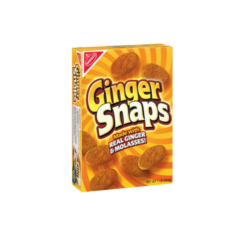Top Class Actions’s website and social media posts use affiliate links. If you make a purchase using such links, we may receive a commission, but it will not result in any additional charges to you. Please review our Affiliate Link Disclosure for more information.

Plaintiff Valorie Winn alleges Mondelez falsely represents its Ginger Snaps products as being made with traditional natural ingredients. The company does not disclose that the cookies contain dangerous levels of PHO and trans fats, the Ginger Snaps class action lawsuit claims.
“PHO is attractive to the processed food industry because it combines the very low cost of unsaturated cis fat with the ‘mouth feel’ and long shelf life of saturated fat,” the Ginger Snaps class action lawsuit states.
A decade ago, PHO was reportedly used in about 40 percent of processed packaged foods, but many companies stopped using PHO after learning about its toxic properties. According to the Ginger Snaps class action lawsuit, PHO can cause cardiovascular heart disease, Alzheimer’s disease, diabetes and cancer. It also reportedly accelerates cognitive decline and increases the rate of memory damage.
In 2015, the U.S. Food and Drug Administration reportedly determined that PHO is not safe for use in food. The federal agency reportedly began filing enforcement actions against companies that use PHOs in 2010. According to the Mondelez Ginger Snaps class action lawsuit, there are many safer and commercially viable alternatives to trans fat, which is a toxin and carcinogen.
“Although safe, low-cost, and commercially acceptable alternatives to PHO have always been available, with many companies switching in the early 1990’s, Mondelez unfairly elected not to use these safe alternatives in Ginger Snaps in order to increase profit at the health of consumers,” Winn argues in the Mondelez class action lawsuit.
Winn accuses Mondelez of falsely advertising its Ginger Snaps and enticing consumers to purchase a product that is harmful to their health. She says she has purchased the Ginger Snaps products repeatedly during the proposed Class Period from a Pak ‘N Save store in California.
Winn says Mondelez marketed Ginger Snaps with the phrase “Made with Real Ginger & Molasses!” According to the Ginger Snaps class action lawsuit, this phrase is misleading because it suggests to customers that the cookies are flavored and sweetened with natural substances.
“This is not true,” the Mondelez class action lawsuit states. “Ginger Snaps contain more highly-refined, added sugar than molasses, and, during portions of the class period, combined more added high fructose corn syrup (‘HFCS’) or refined sugar than molasses and more PHO than ginger.”
The class action lawsuit asserts violations of the California Unfair Competition Law, California False Advertising Law, California Consumer Legal Remedies Act, breach of the implied warranty of merchantability, and breach of express warranty.
By filing the Mondelez class action lawsuit, Winn seeks to represent a Class of consumers who, since Feb. 11, 2006, purchased in California Ginger Snaps Products that contained partially hydrogenated oil and/or included one or more of the following phrases on the label: “Made with Real Ginger & Molasses” and “Sensible Solution.”
Winn also seeks to represent a subclass of consumers who purchased the allegedly deceptively labeled Ginger Snaps products at Pak ‘N Save.
Winn is represented by Gregory S. Weston and Andrew C. Hamilton of The Weston Firm.
The Ginger Snaps Trans Fat Class Action Lawsuit is Valorie Winn v. Mondelez International Inc., Case No. 4:17-cv-02524-DMR, in the U.S. District Court for the Northern District of California.
UPDATE: On May 31, 2017, a California federal judge was urged to dismiss a class action lawsuit alleging Nabisco Ginger Snaps are falsely labeled as containing no trans fat in violation of California state law and FDA rules.
UPDATE 2: On June 28, 2018, a Nabisco class action lawsuit alleging the company’s Ginger Snaps contain trans fats will remain in federal court, instead of going back to state court.
ATTORNEY ADVERTISING
Top Class Actions is a Proud Member of the American Bar Association
LEGAL INFORMATION IS NOT LEGAL ADVICE
Top Class Actions Legal Statement
©2008 – 2024 Top Class Actions® LLC
Various Trademarks held by their respective owners
This website is not intended for viewing or usage by European Union citizens.















6 thoughts onGinger Snaps Class Action Says Cookies Contain Unhealthy Trans Fat
I just had some for dessert…smh
UPDATE: On May 31, 2017, a California federal judge was urged to dismiss a class action lawsuit alleging Nabisco Ginger Snaps are falsely labeled as containing no trans fat in violation of California state law and FDA rules.
I love these and have a box now.
I have always loved ginger snaps!! And always eaten them.
Man, I ate theses all the time. Ty for the info
As children we were raised on ginger snaps. even here lately I have bought them for my 3 year old.